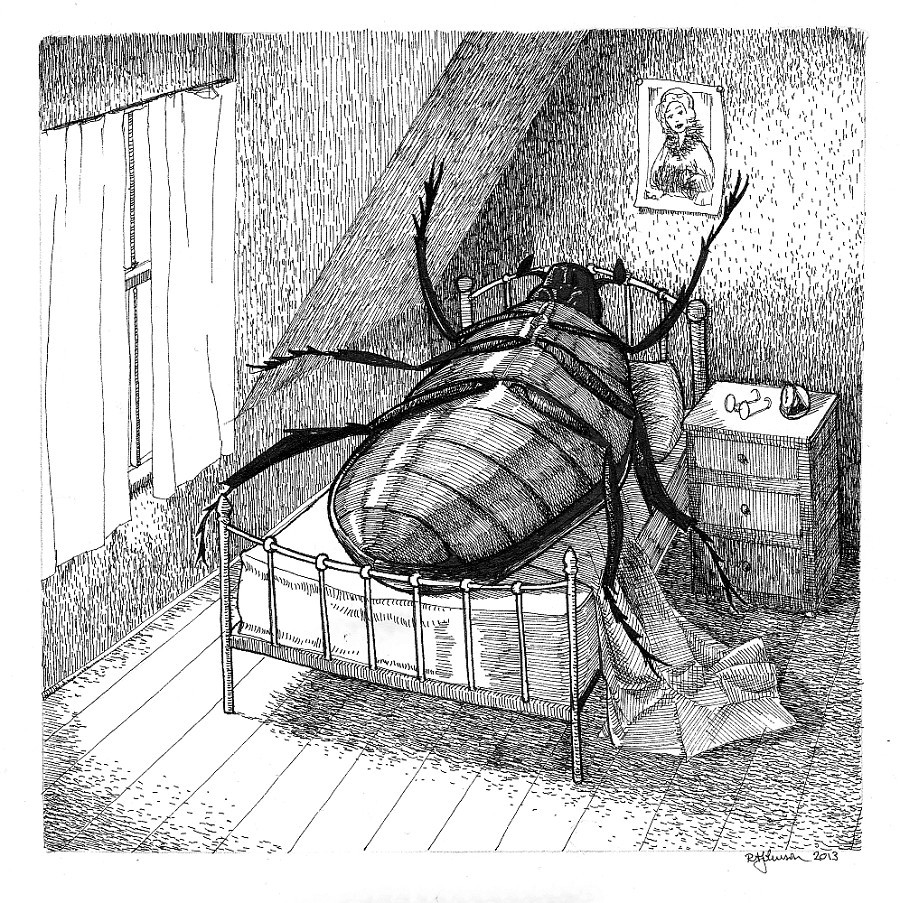by Katherine Lemieux
100 years ago this month, Die Verwandlung, or rather The
Metamorphosis, written by the German-speaking Czech author Franz Kafka, was published and today
it is regarded as one
of the most seminal works of fiction to come from the 20th century. It is a
peculiar and thought-provoking short story revolving around Gregor
Samsa, a travelling salesman with the responsibility of providing for his entire
family, who wakes up one morning to find he has been transformed into a
cockroach/dung beetle/giant insect - there have been many arguments debating the
exact translation from the German phrase ungeheures Ungeziefer meaning monstrous vermin. The
novella tells of Gregor’s attempts to adapt to his transformation and the
impact it has on his aging parents and younger sister Grete.
Franz Kafka is one of the best known writers of
absurdist fiction, with the term "Kafkaesque" being derived from his ability
to create senseless complexity and surreal distortion. The opening line of The Metamorphosis
highlights Kafka’s skill at dealing with the absurd and the widely irrational,
presenting Gregor’s transformation as a random occurrence, yet not questionable
or especially surprising: “One morning, upon awakening from agitated
dreams, Gregor Samsa found himself, in his bed, transformed into a monstrous
vermin.”[1]
This statement of such a totally life-changing event, written with a complete
lack of emotion, is a common feature of the book, where the focus of the story
is not on the sheer impossibility and absurdity of Gregor’s supernatural
transformation but on the more mundane and ordinary, such as how the family is
now going to cope financially because Gregor himself can no longer work.
The book forces us to
question our purpose in life and more crucially ask ourselves why we exist. It
is impossible to define an exact purpose for life and for each individual the
answers to its definition will be varied and most likely unanswerable. However,
is it right that some existences, such as Gregor’s in his vermin state, should
be regarded as less valuable than others? The answer is, of course, not that
simple. Should one argue that Gregor is now without purpose as he is no longer
earning an income for his family and is of little use to society? Or does
Gregor create his own purpose, by setting himself tasks such as climbing along
the ceiling or listening to his family talking next-door?
The Metamorphosis also deals
with the impact of change and its effect on others, for Gregor’s physical
change is mirrored by his family’s rather more emotional transformations. His
parents and sister move from viewing him with love and gratitude to absolute
disgust. Is it fair to judge somebody solely for their physical appearance,
after all Gregor is still able to process human thought and hold opinions?
Gregor becomes a burden on his family who are forced to seek work and alter
their way of living. Rightly so maybe, they are forced to become independent
and self-sufficient, instead of relying on Gregor as the sole-breadwinner.
Gregor’s metamorphosis can
be viewed as a lesson, forcing his family to develop as individual characters
and ultimately taking responsibility for their own lives. The book highlights
the impact others can have on our own lives and vice-versa. It makes us
consider how society works and changes in the face of the unpredictability of life.
Kafka’s novella may be 100 years old but its
ideas and themes are still highly relevant today in our ever-changing world.
These are just a few aspects that I have found especially interesting and
thought-provoking, yet there are many more for each of us to discover. The
beauty of the book is that it leads to a philosophical exploration of Kafka’s ideas,
and, although the story has remained unchanged for a century, the opinions and
interpretations are forever evolving. It is an infinitive metamorphosis.

Comments
Post a Comment
Comments with names are more likely to be published.